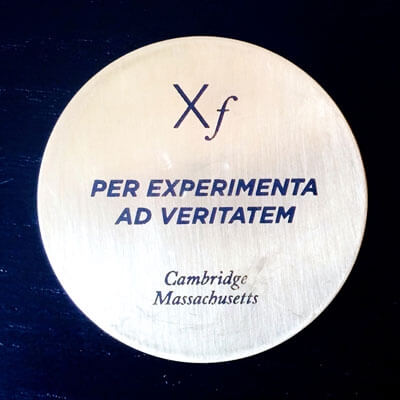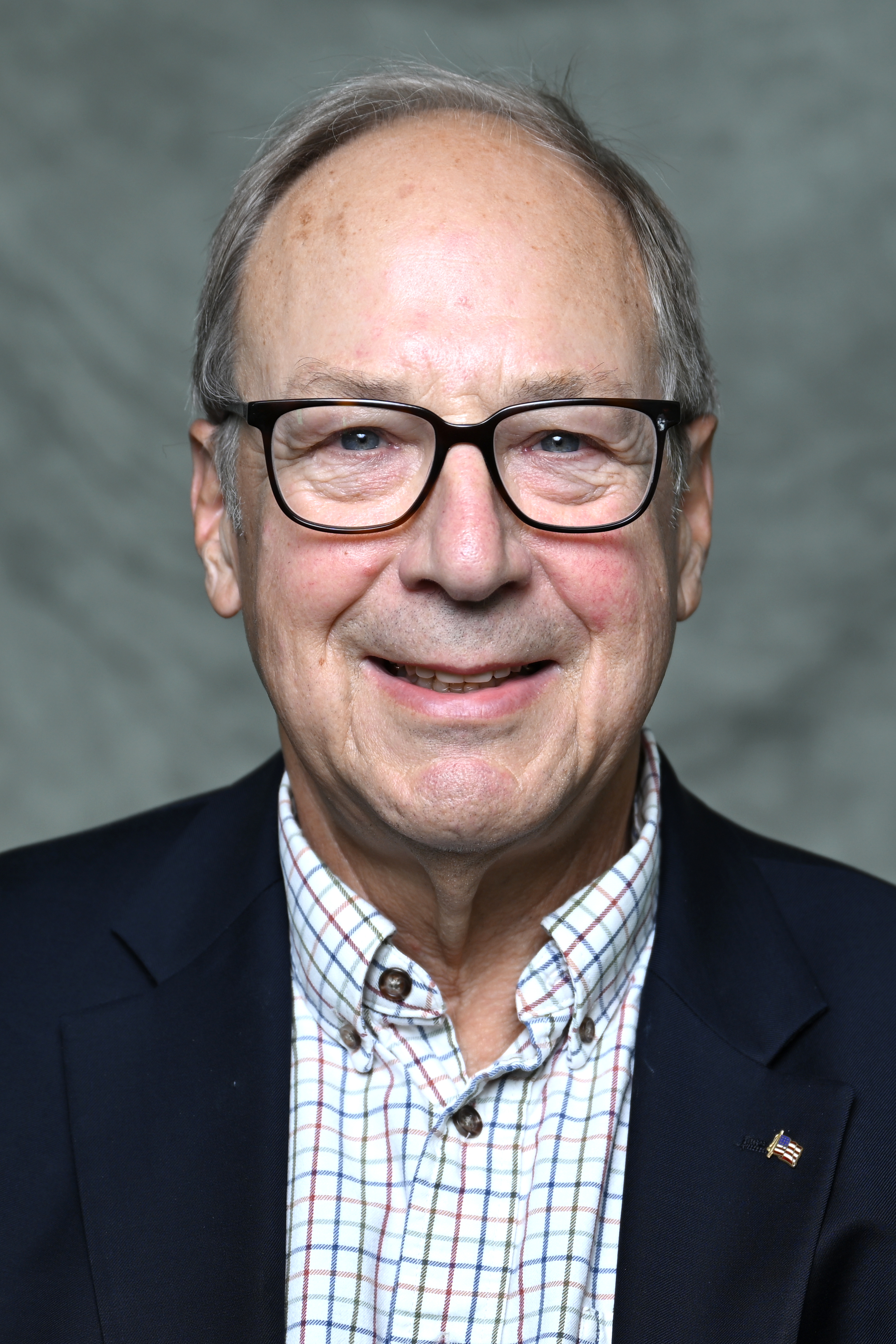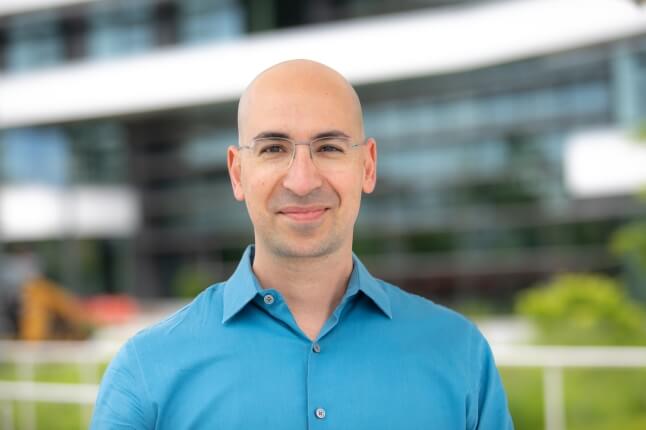News
In its first two years, the Xfund has received more than 3,000 business proposals, 40% of them from Harvard affiliates. The partners have reached out to a thousand of those applicants, offering advice and contacts, and have made early-stage investments in five.
Computer scientist Luis von Ahn was recognized in April with the Experimenter Award (pictured) for his creative ventures into book digitization and language education.
(Photo courtesy of Kara Birkenmayer.)
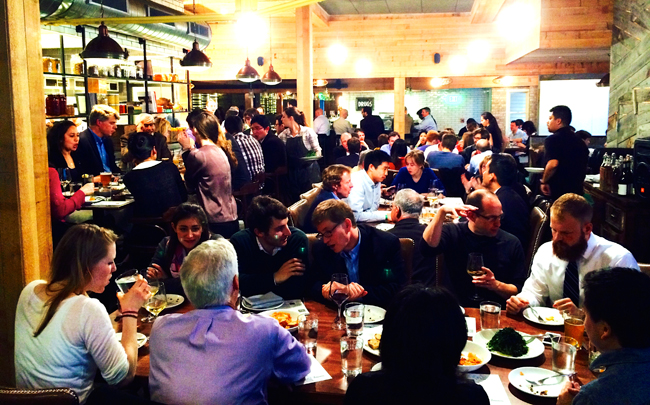
Students, alumni, faculty, entrepreneurs, venture capitalists, and mentors gathered to share ideas and celebrate the Experiment Fund's first two years in Cambridge. (Photo courtesy of Kara Birkenmayer.)
Tuan Ho ’09 and Nick Krasney ’09 have come a long way.
Five years ago, they were plastering the walls of a Dunster House dorm room with aluminum foil, trying to pick up a stronger television signal. Now the company they founded that year—Philo, formerly known as Tivli—offers TV programming over more than a dozen universities’ closed data networks, with tens of thousands of users nationwide.
For any young company, reaching out to find investors, advisers, and resources is hard work.
“I think if we were to do it again, we’d make fewer mistakes along the way,” says Ho.
That’s because in the years since they graduated, new support structures for aspiring entrepreneurs have sprung up across the Harvard campus, part of a cultural shift that really began 15 years ago.
The Technology & Entrepreneurship Center at Harvard, founded at the School of Engineering and Applied Sciences (SEAS) in 2000 through the Lumry Family Endowment for Technology and Entrepreneurship, enabled Krasney, Ho, and current Philo CEO Chris Thorpe '97, Ph.D. '08, to get their business up and running. In 2006, Harvard established the Office of Technology Development to support the research, development, and licensing of advances in science, technology, and medicine. The year 2011 saw the creation of the Harvard Innovation Lab in Allston. Then, in 2012, a group of alumni and venture capitalists launched the Experiment Fund (Xfund), a seed-stage investment fund anchored at SEAS and open to all.
By all measures, the newest addition to the Cambridge innovation community, the Xfund, has found great success during its first two years. And thousands of students today who have the itch to create something of their own can find the support they need without leaving campus.
“When we were students, the idea of approaching a venture capitalist to pitch an idea was very intimidating,” says Ho. By bringing the experts closer to campus, the Xfund has “lowered that barrier of entrance, so that if I’m a computer science student or an engineering student… I don’t feel too intimidated to walk into the Xfund office and say, ‘Hey, I have this cool idea—can you help me?’”
“This is a really big deal,” adds Krasney, who has left Philo to study at Harvard Business School. “Harvard is an old, storied institution that is now telling students that creating a company is a legitimate way to explore, to make a difference, and develop new ideas.”
As innovation fever sweeps the campus, it is drawing on some of Harvard’s most enduring qualities—like bold vision, leadership, experimentation, and an appreciation of the legacy a single idea can create.
“Harvard was literally the first seed investment in America,” declares Xfund partner Hugo Van Vuuren '07, MDesS ’12, with a slight glimmer of provocation. “By John Harvard—he gave half of his estate and his library. I don’t know if there was a term sheet, but it was definitely a seed investment, and look at it today.”
Historians will note that Harvard did not see the need for a school of business until 1908; nor, until much more recently, were undergraduates particularly encouraged to pursue business opportunities that arose during their time on campus.
“Until the year 2000, it was actually improper to incorporate yourself as a business if you were living in a Harvard dormitory,” notes Harry R. Lewis, Gordon McKay Professor of Computer Science at SEAS and former dean of Harvard College. Now, he says, “the mood has changed. There have always been entrepreneurial students who were doing things outside of classes, but the spirit the institution [now] conveys is that this is a productive part of American society.”
And there’s a large appetite for it among the students.
In its first two years, the Xfund has received more than 3,000 business proposals—40% from Harvard, 20% from MIT affiliates, 9% from Stanford affiliates, and the remainder from around the world. (Although anchored at Harvard, the Xfund invests in companies and teams regardless of their university affiliation or background.) The partners have reached out to a thousand of those applicants, offering advice and contacts, and have made early-stage investments in five, including Philo and another Harvard student venture, Kensho. Those first five companies are now worth an average of 10 times their initial value.
But according to Xfund partner Alan Crane ’86, MBA ‘92, it’s not simply about identifying young companies that will turn a profit; it’s about “really seeking to inspire the next generation of entrepreneurs.” The Xfund supports “companies undertaking experiments that have the potential to profoundly shape our lives and change the world in a positive way.”
Or as partner Harry Weller, MBA ’98, puts it, “We’re not investing just in innovation. We’re investing in potential leadership.”
“When you’re starting a new company, there’s so much to do, and they are great supporters,” says Dulcie Madden, co-founder of Rest Devices. Her company aims to produce baby clothes with embedded sensors that monitor a child’s sleep patterns and breathing to give new parents peace of mind. Rest Devices is one of the first companies to receive seed funding from the Xfund, along with strategic advice, personal mentorship, and access to the partners’ networks.
“Hugo talks about us all as family,” Madden says. “You know they’ve got your back.”
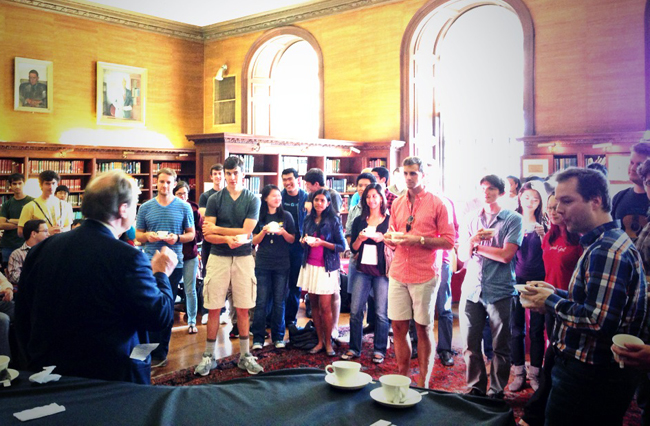
Harry Lewis (left), Gordon McKay Professor of Computer Science, provokes new ideas at an Xfund Experimental Tea. (Photo courtesy of Halah K. AlQahtani.)
The Xfund has hosted about a dozen Experimental Teas at Eliot House—intergenerational gatherings where students, faculty, aspiring entrepreneurs, and successful business-builders mingle to discuss a single bold question: “What can plants teach us about renewable energy?” “How will computational modeling change how we view the economy?” “How can technology explain law and uncover the inner thinking of judges?” More than 500 people have participated in these events.
It seems only natural that such transdisciplinary discussions would take place in the heart of the liberal arts.
“The University has an environment that serves as a catalyst for good things to happen,” says Ho. “Good ideas here actually bear fruit.”
And Cambridge, with its concentration of intellectual talent, has no shortage of good ideas. Proposals submitted to the Xfund have suggested 3,000 ways to improve biotechnology, energy, consumer Internet and media, health care and IT, social entrepreneurship, and robotics, among other topics.
“If people have an interest to do graduate school, or join an investment bank or a management consulting firm, we have traditionally done amazing things to support those choices,” says Xfund partner Patrick Chung AB ‘96, MBA-JD ’04. “When people have a passion to start a business which can have just as much (and possibly more) social impact, financial impact, and intellectual impact as any one of those paths, this university to its credit has said, ‘Yes, we need to support that as well.’”
“What we’re doing here is special,” says Van Vuuren. “We’re not a traditional venture fund where we just look at how much money we’ve made or count the investments—we count that too, and we’ve been lucky enough to do well—but we believe that Cambridge has an immense amount of potential that is untapped. With the right support, young college graduates who might normally have followed traditional career paths 'by default' will be more willing to take risks, to experiment, and discover a true calling.”
The Xfund marked its two-year anniversary in April with a series of talks and social events billed as an Experiment Assembly.
Reflecting on the initiative’s success, Douglas A. Melton, co-master of Eliot House, Xander University Professor, and Thomas Dudley Cabot Professor in the Natural Sciences, invoked the words of Charles Eliot, the 19th-century Harvard president who is credited with transforming Harvard from a college into a university, embracing both the humanities and the sciences: “We would have them all, and have them at their best.”
“I think today’s events would have made him happy,” Melton said.
Topics: Entrepreneurship, Awards
Cutting-edge science delivered direct to your inbox.
Join the Harvard SEAS mailing list.
Scientist Profiles
Harry R. Lewis
Gordon McKay Professor of Computer Science, Emeritus
